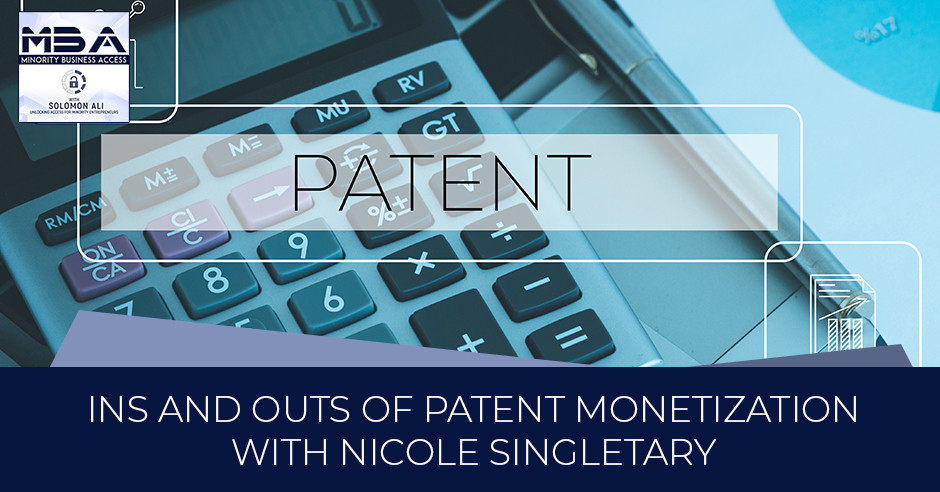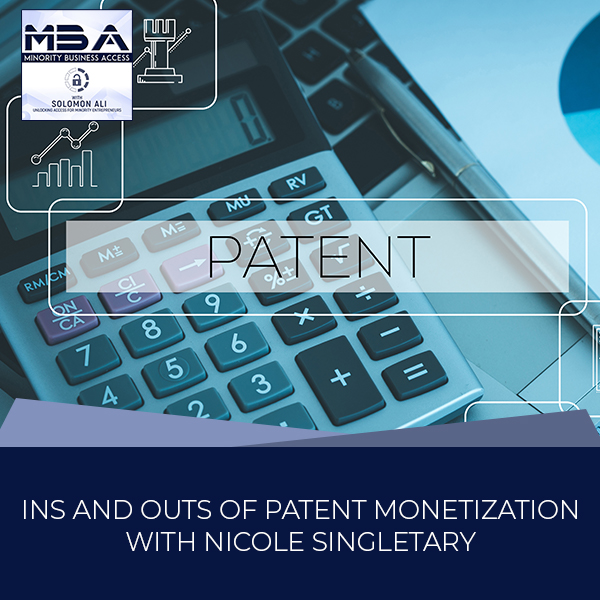
Ideas, inventions, and innovations are what shape the world of tomorrow. Patents are what proves these are yours, and these patents can be used for monetization as a benefit and incentive for your hard work and resilience. Nicole Singletary of RI Holdings joins this episode to share her expertise in getting your ideas and inventions protected and patented. She details the different people involved and emphasizes the amount of dedication and sacrifice you need to make it work. Learn the different processes you need to prepare to ensure you reap the benefits you deserve.
—
Watch the episode here
Listen to the podcast here
Ins And Outs Of Patent Monetization With Nicole Singletary
Nicole it’s exciting to have you here on MBA. I’m pleased that after all the request I had that you finally decided to do it. I won’t do you justice because you will do a whole lot better introducing yourself. Please introduce yourself and tell them who you are and what you do.
I’d like to thank you for having me on your show. I’m excited about your show and what it means to the community and the opportunity to be here and share. My name is Nicole Singletary. I am an entrepreneur and an investor. I work with RI Holdings where I manage a private equity portfolio. I’m excited about that portfolio because in our portfolio, we self-fund all of our projects. There are many organizations out there that don’t and we do. I also am involved with intellectual property management, as well as a marketing company and also hopefully a venture in the real estate holdings market.
For my audience, could you tell us a little bit about what do they need to know to deal with RI Holdings, a private equity company, to get investment capital?
In terms of RI Holdings, we personally involve ourselves in the investment in a company. What they need to know first of all is be honest and open about where they are and where their company is. Allow us and our professionals to have the opportunity to evaluate that situation. They should not be afraid of certain challenges that they may have because we specialize in challenges. We specialize in chaos. With honesty and transparency, we are able to take a look at where a company is and if it’s a fit for us take it on. When we take it on, we take it all the way.
I know several companies that you’ve been involved with in loaning money to and working with CEOs and helping them to go through that working capital and build their companies and their market. Could you tell us a little bit about that?
Working with CEOs especially when we sit on the private equity side, sometimes you feel like you’re on opposite sides of the table if you’re not evenly yoked. We are experienced and voiced with the challenges that sometimes come with CEOs. We love CEOs that have a great deal of knowledge about not just their product or their business, but the industry they’re in, where the industry is going, the challenges of the industry and opportunities outside of their company that we might be able to exercise in terms of scaling their company for growth.
Managing your cost is a challenge when trying to monetize your patent.
One of the exciting things that I’ve seen you do is the smart home technology. You were undefeated in pursuing the license agreements and things of that nature, where you were the underdogs going in this situation. For my audience, people who might have patents or business startups or maybe even in the 3 or 4 years of business, what would you say to them?
If they have patents, we often have requests to take a look at patent portfolios. I believe our group now exercises 3 to 4 deep dives a week, just to see where the patents are. Not everything is patentable but if it is and we can help, we do. One of the things that we specialized in with our venture into IP was managing this scenario for the investor, the entrepreneur or the inventor. We keep our heads down and the cost low. The challenge when you’re trying to monetize your patent is to manage your cost. We’re very much aware of how expensive it is. We do try to provide value and a great service for our clients in that.
As a young entrepreneur maybe in the first 4 or 5 years, I’m looking for money and I want to get some money. Do I have to have it all together or can I come to you and have an open conversation?
You can have an open conversation but at some point, we’re going to have to work with you to pull it all together.
You will help us to do that?
We would definitely help you do that.

Patent Monetization: When getting investment capital, it’s important to be honest and open about your company’s situation and allow the professionals to evaluate.
I don’t have to have it all together, but I’m looking for lots of money, millions of dollars. In other words, what is your threshold?
Depending on the industry, our threshold could start with an investment of $250,000 and grow that investment to several million dollars. If you don’t have it all together, it’s pretty much a guarantee that we would start with a small investment and grow that investment. There have been other industries where we have had the opportunity to come in and deal with scenarios that are between $5 million, $15 million or $20 million. It depends on the lift. We don’t mind a heavy lift but if it’s a heavy lift, the investment is typically lower. As the relationship grows and the business grows, we stay with that business and continue investing throughout.
You work with various types of businesses in various industries. What is the exciting thing in working with different entrepreneurs?
Especially when you have someone that comes in and they’re certain, but not very certain and you have a plan, you work that plan, you’re hitting your milestones and you’re hitting your goals, the funding is there. It becomes easier and easier to obtain. All of a sudden, you see them materialize what the discussion was 3 or 4 years prior to that. You see the excitement of that and you see the excitement of someone who came in. It was maybe an entrepreneur that had 2 or 3 people working for them. Now they’re taking care of 10, 12 households. They also have the opportunity to reach back and bring along someone else who’s may be struggling with an idea or purpose or something.
What’s next for you?
I’m not sure. I am taking a deeper look at real estate investments. I’m also focused on a patent farm, where we will bring on individuals who will help us seek new life and new civilizations, to go to those frontiers that haven’t necessarily been recognized. We’re looking to bring on new mechanical engineers, researchers, graphic artists, all these people that come together and help in the development of a patent portfolio. I’m also looking to extend that opportunity to minority students. One thing I’ve realized in dealing in the IP world is that there are not a lot of brown faces. I could easily be in a room and be the only one. The question is why? The answer was there is a lack of casework for minority students, a lack of opportunity. What I’m looking at now is how can we take our farm and integrate this other aspect of opening the IP world up to minorities and create a whole new generation?
Believe in and never give up on yourself. Challenge yourself daily.
When you say open it up, are you talking of minority entrepreneurs, attorneys, engineers?
I’m talking of attorneys, mechanical engineers, graphic artists, social media, marketing people. All these people are necessary in the development of a patent portfolio. You don’t think about it, but they are. Most people think law firms. Law firms are a large part but not the totality of it.
Is that the secret sauce that you use to win and be victorious?
Definitely. It takes a partnership. It takes a village and with every law firm opportunity. There are also engineers behind that. There are graphics people that are drawing out your patents and illustrating for you and things like that. There are people who research, who go to see what other ideas or patents or prior art there may be out there that’s similar to you.
When you are looking at a new patent, what goes into that?
We have business development people, attorneys, probably engineers on our team that would take a look at the portfolio or the patents that we’re examining. They take it apart and put it back together to see how it works. That’s a simplistic way of saying it. You have people that are researching the prior art to see if anyone else out there had that idea or that patent opportunity. That’s both in the US and internationally as well.

Patent Monetization: Law firms are a large part in building a patent portfolio, but they’re not the totality that you need. It takes a partnership with experts from other industries.
For my audience, what suggestions would you give someone whether they are an inventor looking to get into this space or potentially an attorney or engineer? You pick which category. If it was an entrepreneur, what would you suggest that they do?
The first things I would suggest, especially with a patent opportunity is be able to prove it. Be able to prove it works, prove that you have it and prove the art on it prior to contacting someone. That would save a lot of time, effort and money initially upfront to be able to prove it. The second is believe in it. If you’ve gone through the trials of writing a patent, having a patent at the patent office and all that goes with prosecuting a patent there. Believe in it and be willing to take it out all the way and also understand that in doing so, it’s your baby. You may have to hand that baby over and let other people foster it and create something that you can at some point monetize.
You are very good at monetizing. I could definitely speak to that. What about the engineers and the attorneys or students who are going to school that may want to take this field? What would you suggest for them?
I would suggest to them that they reach out to someone, a law firm, an equity group or someone who’s into intellectual properties. At the least, create a relationship and a mentorship. Also, look to be included in the casework so that they establish a portfolio. If it’s something that they want to do for a law firm or equity group later on, they have proof that they can do the work that they participated.
What about engineers?
It’s the same thing. There are many IP law firms that have both an engineering and a JD. That makes you more marketable.
Do not be afraid of failure. It’s an opportunity to learn and grow for the next opportunity.
You said something about graphics artists. I didn’t know that was needed.
I’ll be perfectly honest and tell you I was two years into it before I realized that we were paying graphic artists to draw the illustrations for the patents. I figured it was some type of computer-generated situation but no, they’re actually graphic artists.
People, if you’re looking, you’re an artist and that’s what you like to do, this may be something for you. There’s a lot of money in it. You’re working with intellectual property and things of that nature and working with the law firms. It’s very exciting and rewarding on the backend. Nicole, I want to thank you so much for coming on MBA, Minority Business Access. What would you say to them as your closing statements that they should think about?
I would say to anyone, whether you’re interested in IP or equity or selling pencils or whatever, believe in yourself and never give up on yourself. Challenge yourself daily. Don’t accept no. If you hear no, then why no? No is not official until the thirteenth no. Do not be afraid of failure. Failure in every instance is an opportunity to be better and to grow for the next opportunity. People say failure is not an option. That’s not real. Failure happens but I consider failure to be a learning opportunity.
How expensive is it? I know a lot of entrepreneurs and a lot of people that have intellectual property, then they run out of money. What do you say to that? Do they have to give up a lot when they come to a group like you?
If you do not have the money to engage a firm or a group or whatever, you’re going to have to give up something and it’s going to be some type of position, be it equity, debt financing or whatever. That’s being honest. Nothing’s free and hopefully if your idea or product or invention is a good one, at some point, you can find yourself back on the majority side of that. Initially, if you need a lot of help, it’ll cost you.

Patent Monetization: Be willing to do all that you can and make things happen. When you have that other people become vested in you and have that attitude.
It is expensive and costly to move it. Should they be willing to give up 10%, 20% ownership or is that case by case?
It’s case by case but 10% to 20% is low. If you have no money, 10% to 20% is low. He who has the cash and he who has the service get to dictate the terms.
Is there anything else that you will suggest that someone needs to know?
Just be steadfast and believe in yourself and what you have. Be willing to do all that you can and sacrifice to make it happen. When you have that attitude, other people become vested in you and have that attitude as well.
Thank you so much, Nicole. I appreciate it.
Thank you, Solomon.

